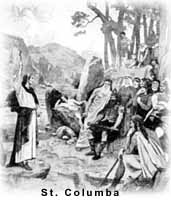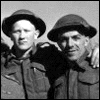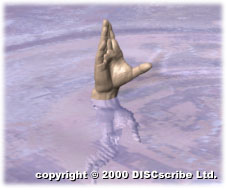
|
Part Three by Andrew Morrison
Does this mean that they are also wrong to identify second sight with the biblical notion of "prophecy"? We are used to thinking of prophecy as a uniquely Judaeo-Christian phenomenon, and in the sense of "speaking on behalf of God" as opposed to "prediction", this seems only logical. And yet, let us look at the passage in 1 Corinthians 12, where St Paul identifies prophecy as one of the "gifts of the Spirit". The other gifts such as knowledge, wisdom, healing and even faith are apparently distributed to Christians and non-Christians alike, so why not prophecy? Muslims, for instance, certainly have faith and they have knowledge and they heal: why can they not also make prophecies (aside from the fact that they believe Mohammed was the final prophet)? And if Muslims, why not ancient Druids? Columba referred to Christ as his Druid and he and the other early Celtic saints, many of them trained in the old religion, had the utmost respect for the spiritual powers or gifts of the Druids. A comparison of the incidence of stories about prophecy/second sight in early Christian and Druidical traditions is revealing. This sort of thing seems to have been much more a feature of the shamanistic Celtic religion than of ordinary early Christianity, and consequently it seems likely that it found its way into Celtic Christianity from the former rather than the latter source. There would be nothing unusual about this. The tension between the Celtic and Roman churches, which came to a head at the Synod of Whitby in 664, arose because both had changed and developed, separately and apart. Both exemplified the "syncretistic" nature of a developing belief-system, the Roman church borrowing the authoritarian and imperialistic qualities of its own city on its journey towards full separation and independence from the Orthodox church, and the Celts borrowing many other qualities from their own native traditions. I believe, then, that second sight is one of those features of what we call Celtic Christianity, which were borrowed from pre-Christian Celtic traditions. If it is not a peculiarly Christian gift, does it still have a value for Christians? Well obviously faith, healing and wisdom do. But I suppose the most pressing question relating to its value for many must be, can a disaster once foreseen be prevented.
Some would make a connection between the second sight and the popularity of Calvinism in the islands, suggesting that what was foreseen was preordained and was somehow "God's will". Is that what I think the premonitions are "for"? Not entirely. Otherwise they might be made more believable and be given before the greatest human tragedies. Are these premonitions given us in order that we might become urgently aware of our mortality and repent of our sinful ways, whether or not we thereby earn a suspension of our sentence? The story of Jonah comes immediately to mind: you will recall that the prophet became famously peeved when the Assyrians repented and the city of Nineveh was spared. Biblical scholars tell us that this story comes into the category of uplifting fiction rather than history, but the real Old Testament prophets were also certainly well aware of the potential for repentance underlying their frequent predictions of disaster, and that repentance might lead to prevention. And, I suppose, my great-uncle, after receiving his warning, was able to spend his last night in prayer and in settling his affairs with his family and close friends; one just wonders why all of his men were not given the same opportunity.
Some Protestants might object that this approach would seem to belittle the role of something called objective Truth. But to Greeley, I suspect, all divine Truth is ineffable and all expression of it metaphorical; the greater mistake is having the hubris to think you know where the literal ends and the metaphorical begins. I have no difficulty in saying that phenomena such as the second sight, which contribute to a sense of the miraculous and the supernatural among believers, Christians and non-Christians alike, are resources we have been given, and that we are all the poorer if we ignore them. Through such windows we can see the limitations of our current scientific knowledge and in some cases restore to ourselves some sense of humility and of wonder. Better to find the stories into which we can integrate these epiphanies, than to reject them altogether. Meet the author, Andrew Morrison
Celtic Spirituality and the Gift of Second Sight Main Page |
Thursday, December 26th, 2019
Attention visitors: Tartans.com is back. Please note that this is a snapshot of the site as it existed nearly 20 years ago and you may encounter broken links; we are still combing through the site and correcting those as we find them. Please also note that some sections are currently not functional, primarily the discussion forums/clan chat boards.
|
** HOME - First Time Visitors - Glossary - - Contact Us ** Awards | Bibliography | Clan Calendar | Clan Chat | Clan Finder | History | Famous Scots | Genealogy | Great Hall of the Clans | Links | News and Features | Scots on the Net | Search | Site Map The Gathering of the Clans
Copyright 1995- Tartans.com - All Rights Reserved. |
 Raghnall MacilleDhuibh, following Adamnan, clearly associates the gift of second sight with the spiritual status of the seer. Columba, they say, received this gift because of his life of prayer and general holiness. However the coincidence does not seem to extend much beyond Columba himself. There seem to have been plenty of people who report the faculty and are not unusually holy and plenty of other apparently holy people who have no such experience. The connection with holiness would seem to be weaker, for instance, than in stories of levitation among monks at Mount Athos. Nobody except the odd monk seems to report having levitated on a regular basis.
Raghnall MacilleDhuibh, following Adamnan, clearly associates the gift of second sight with the spiritual status of the seer. Columba, they say, received this gift because of his life of prayer and general holiness. However the coincidence does not seem to extend much beyond Columba himself. There seem to have been plenty of people who report the faculty and are not unusually holy and plenty of other apparently holy people who have no such experience. The connection with holiness would seem to be weaker, for instance, than in stories of levitation among monks at Mount Athos. Nobody except the odd monk seems to report having levitated on a regular basis. But, if anything, the phenomenon would seem to be more associated with the older Catholic traditions in the islands (for instance, in South Uist) than with the newer Protestant ones. And why would Dr. Orloff build her practice around such insights if she did not feel intervention could be useful? My grandfather reportedly tried to talk his brother out of risking his life unnecessarily the next day, but in his case Calvinism combined both with a typical soldier's fatalism and a sense of duty to make that unthinkable. That doesn't mean he could not have saved his life if he had contracted a case of the blue flue, or perhaps shot his foot off, and stayed in his trench. Yes, I do suspect that some prophecies can be averted.
But, if anything, the phenomenon would seem to be more associated with the older Catholic traditions in the islands (for instance, in South Uist) than with the newer Protestant ones. And why would Dr. Orloff build her practice around such insights if she did not feel intervention could be useful? My grandfather reportedly tried to talk his brother out of risking his life unnecessarily the next day, but in his case Calvinism combined both with a typical soldier's fatalism and a sense of duty to make that unthinkable. That doesn't mean he could not have saved his life if he had contracted a case of the blue flue, or perhaps shot his foot off, and stayed in his trench. Yes, I do suspect that some prophecies can be averted. Perhaps another answer can be found in the somewhat paradoxical pages of Andrew M. Greeley's "Religion as Poetry". Faced with what might be called the paranormal, Greeley tends to wear his sociologist hat and would probably be as skeptical as Carl Sagan. And he pours scorn on the notion that the popular religious practices of the middle ages had much to do with what we would call Christianity today. But as a Catholic priest he champions the "analogical" imagination of Catholics over the "dialectical" imagination of Protestants. In other words, their very syncretistic tendencies give Catholics a richer tradition of stories, which in turn make them more receptive to potential epiphanies when they occur, and help them to recognize and then integrate these epiphanies into their narrative tradition. If there is a value in maximizing the number and significance of such epiphanies (and arguably there is no greater value imaginable), then perhaps we should just stop being dialectical and instead simply relax and enjoy them.
Perhaps another answer can be found in the somewhat paradoxical pages of Andrew M. Greeley's "Religion as Poetry". Faced with what might be called the paranormal, Greeley tends to wear his sociologist hat and would probably be as skeptical as Carl Sagan. And he pours scorn on the notion that the popular religious practices of the middle ages had much to do with what we would call Christianity today. But as a Catholic priest he champions the "analogical" imagination of Catholics over the "dialectical" imagination of Protestants. In other words, their very syncretistic tendencies give Catholics a richer tradition of stories, which in turn make them more receptive to potential epiphanies when they occur, and help them to recognize and then integrate these epiphanies into their narrative tradition. If there is a value in maximizing the number and significance of such epiphanies (and arguably there is no greater value imaginable), then perhaps we should just stop being dialectical and instead simply relax and enjoy them.